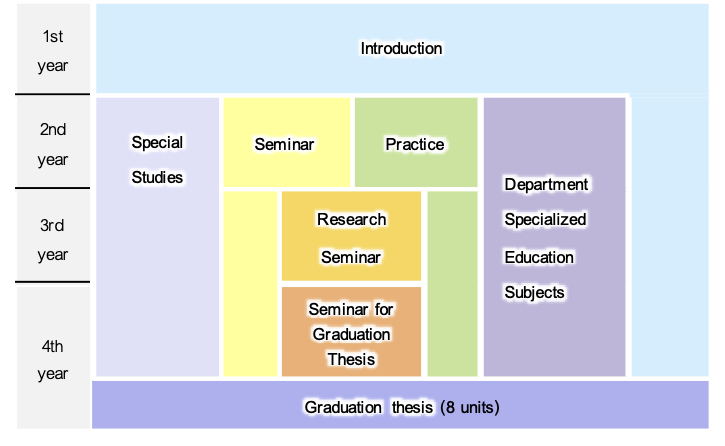Department of Human Sciences
Courses of the Department of Human Sciences
The Department of Human Sciences provides two courses, the comprehensive learning-based Education-Philosophical Anthropology Course and the Psychology Course that focuses on psychology. Furthermore, the Department provides a Childhood Education Specialist Program aimed at nurturing kindergarten and elementary school teachers.
・Education-Philosophical Anthropology Course
The aim of the Education-Philosophical Anthropology Course is that students will widely study and conduct research on phenomena relating to human development and human existence, covering school education systems, curricula and methodology, the reality of adult and life-long learning and other educational phenomena, issues in philosophy and ethics, as well as body culture, arts, the media, etc.
・Psychology Course
Students broadly study various fields of psychology from the basics to practical, applied and clinical psychology. The course starts by teaching students to value a careful observation of people, society and culture as members of the Faculty of Letters, and to respect diversity and individuality, and to foster in them an ethical stance and ability to make decisions. Based on this, students go on to equip themselves with psychological knowledge and skills, and independently raise questions about real people, society and culture and explore the questions. Through these studies students learn the basic scientific methodologies for psychology-based lifestyle practices, social and industrial applications, and education, welfare and clinical settings.
In the course of study in the Faculty of Letters, students on the course are likely to be stimulated by the diverse disciplines related to people such as those bordering on psychology (education, sociology, artistic and body culture) as well as literature, linguistics, geography and history. Students on the course are also able to study the Specialized Subjects of the faculty and related to the acquisition of qualification as Certified Public Psychologists. By going to the Graduate School’s master’s course and studying the designated subjects, students become qualified to sit the national examination for Certified Public Psychologists.
・Childhood Education Specialist Program
The Childhood Education Specialist Program is a program to cultivate kindergarten and elementary school teachers. Its objectives are to enable students to acquire knowledge and skills regarding early childhood and elementary education, and through specialized study in the Department of Human Sciences become equipped with the ability to observe and think in a logical and critical manner about education issues and issues related to education practices in contemporary society, and to nurture teachers able to contribute to the future creation of society and culture from an education perspective.
Unlike other universities whose main aim is to cultivate teachers, students on the Program do not only study the so-called teaching certificate subjects (Program Specialized Subjects) but also study languages and liberal arts subjects in their first year and a wide range of the subjects available at the Faculty of Letters (Faculty Common Subjects). In the second year of the Program, students start to study philosophy and ethics, education, music education, body culture, and the specialized areas of psychology. In the third year, after choosing courses (the Education-Philosophical Anthropology course or the Psychology course) they study through course seminars and so on, and in the fourth year they write their graduation thesis on their specialist area.
In order to study on the Program, it is necessary to enter the University through the High school Recommendation-based Selection Process. It is not possible to take the Program through entry by the General Selection Entrance Examination or other Special Entrance Examinations.
Message from the Department:Everything Begins with the Questioning of Humanity
What will you learn in the Faculty of Letters? Perhaps the first fields that come to mind are Literature, Languages, History, or Society. However, all these phenomena have been created by humans. The Department of Human Sciences offers examinations of humanity, both theoretically and practically.
Have you ever felt somehow suffocated or empty even though you are surrounded by material things and enjoy wealth and freedom? What is it that we humans have gained, and what have we lost?
Also, have you ever been encouraged or had your spirits lifted by someone you just met coincidentally, or felt spiritually liberated when you engaged in physical activity like a child?
Seemingly insignificant questions may become increasingly more confusing the more you think about them, and you may feel bewildered at being drawn into countless unfathomable questions. However, the ability to live in this Age of Incomprehension certainly cannot be acquired through half-baked attempts at understanding. Thus, the Department of Human Sciences provides two courses that prescribe one course of action: to wonder exhaustively.
Curriculum Features
In their first year, students take a broad range of “Introductions”. In order to comprehend humanity, it is desirable to acquire a good understanding of what humans have done thus far—that is to say, the creation of history, culture, and language.
Beginning in their second year, students acquire specialized knowledge in various fields through “Special Studies”. In “Seminars” and “Practices”, students not only increase their specialization but also learn basic skills for academic learning. The second year is packed with signature subjects of the respective courses.
In their third year, students finally begin preparations for planning and conducting their own original research. In third-year “Research Seminars”, students learn how to structure and discuss research, then in their fourth-year “Seminars for Graduation Thesis”, they undertake actual research activities, the results of which are summarized in their graduation theses.

Figure: Overview of the Department of Human Sciences Curriculum
Distinctive Activities
Philosophical Anthropology of Disparity and Rapport Project
Whether it be the issue of “Social Withdrawal”, the “Elementary School First Grader Problem”, or the “Elderly Problem”, initially there was no tangible “problem”. It is only when someone views them as problems that such “problems” come into existence. It is therefore impossible to avoid a question regarding such views: “Why, then, are phenomena deemed to be ‘problems’ in this sense?” Keeping in mind such views, the Philosophical Anthropology of Disparity and Rapport Project questions human existence in its various (physical, social, historical, transcendental, etc.) dimensions.
